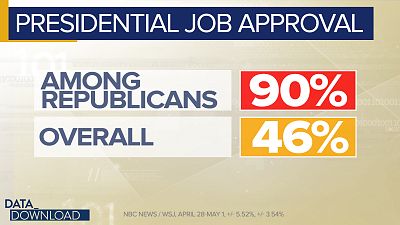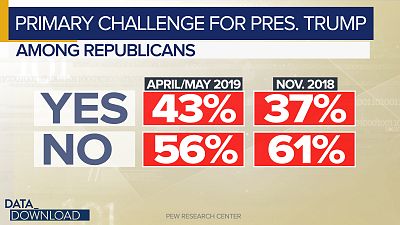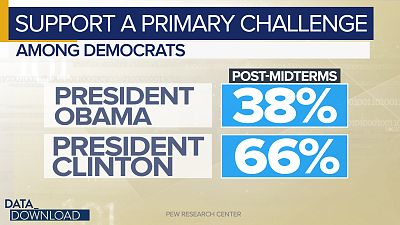There is still something of a split lurking behind the united front of Trump's Republican Party
WASHINGTON - Four years ago, Donald Trump ran for president as Republican outsider, today polls show the GOP faithful have become the core of Trump's support. But look closer at the numbers and there are some signs of discontent among in the party rank-and-file as the 2020 election nears.On the surface, the president's Republican base looks rock solid. From Gallup to the NBC News/Wall Street Journal poll, nine out of 10 Republican say they approve of the job Trump is doing in the White House. And the Republican support is helping keep Trump afloat.
Those GOP numbers have been relatively consistent for the president. He hasn't been below 77 percent approval among Republicans in Gallup and hasn't dropped under 78 percent with Republicans in the NBC/WSJ poll.But data from the Pew Research Center suggests some of the president's GOP support may be a little squishier than it seems. In a May survey, the Center found that more than 4 in 10 Republicans wanted to see Trump face a primary challenger and that number was up from a survey taken just after the 2018 midterms.
The increase, while small, is noteworthy.During Barack Obama's presidency, Pew asked the same question of Democrats and found that just after the 2010 midterms, when the party took a shellacking, 38 percent of Democrats wanted Obama to face a primary challenge. But by August of 2011, the number had dropped to 32 percent.To be clear Trump's 43 percent number doesn't spell doom in any way. In December of 1994, after another bad midterm election for the incumbent, 66 percent of Democrats wanted President Bill Clinton to face a primary challenge and, of course, he went on to an easy win in 1996.And the real news in these numbers isn't about a primary challenge for Trump. He already has at least one challenger in the Republican Party, though former Massachusetts Gov. William Weld may not be the marquee name some Republicans are hoping to see. Earlier this week, Maryland Gov. Larry Hogan (R) decided against mounting a primary challenge.But the support for a Trump primary challenger is noteworthy for a few reasons.First, it is being driven by a few segments of the party, particularly urbanites, young people and those with a bachelor's degree.
Trump's challenges with those voter segments already have created some problems for the GOP. The 2018 midterms that saw big advantages for Democrats among voters in those groups and that yielded a 40-seat gain for the party in the House of Representatives.If Republicans in those voter segments are not fired up to turn out for Trump in 2020it could deepen problems for the party in House and the Senate, where the 2020 map is less favorable for Republicans.Arizona, Georgia and North Carolina all have incumbent Republican senators up for reelection in states with fast-growing metro areas and with large minority populations that are already heavily Democratic. And Colorado, which also has a Republican senator up for reelection, holds fast-growing metro areas and a large number of voters with a bachelor's degree.Then there are the potential concerns for Trump himself. If 43 percent of Republicans want to see him challenged for the nomination, it suggests that some of that 90 percent job approval may be pretty tepid and that could be a major problem for the president in 2020.Trump has not spent his presidency trying to broaden his appeal. Instead, he has focused on serving and placating his GOP base. That has left him with a very slim margin for error.Remember, Trump lost the popular vote in 2016 and won the Electoral College by a total of 78,000 votes in three states - Michigan, Pennsylvania and Wisconsin. He's not in a strong position to weather even a slight dip in GOP support.The distinct voter groups behind that 43 percent that want a primary challenger for the president suggests that there still something of a split lurking behind the united front of Trump's Republican Party. And any kind of split in the GOP makes Trump's reelection fight harder.














